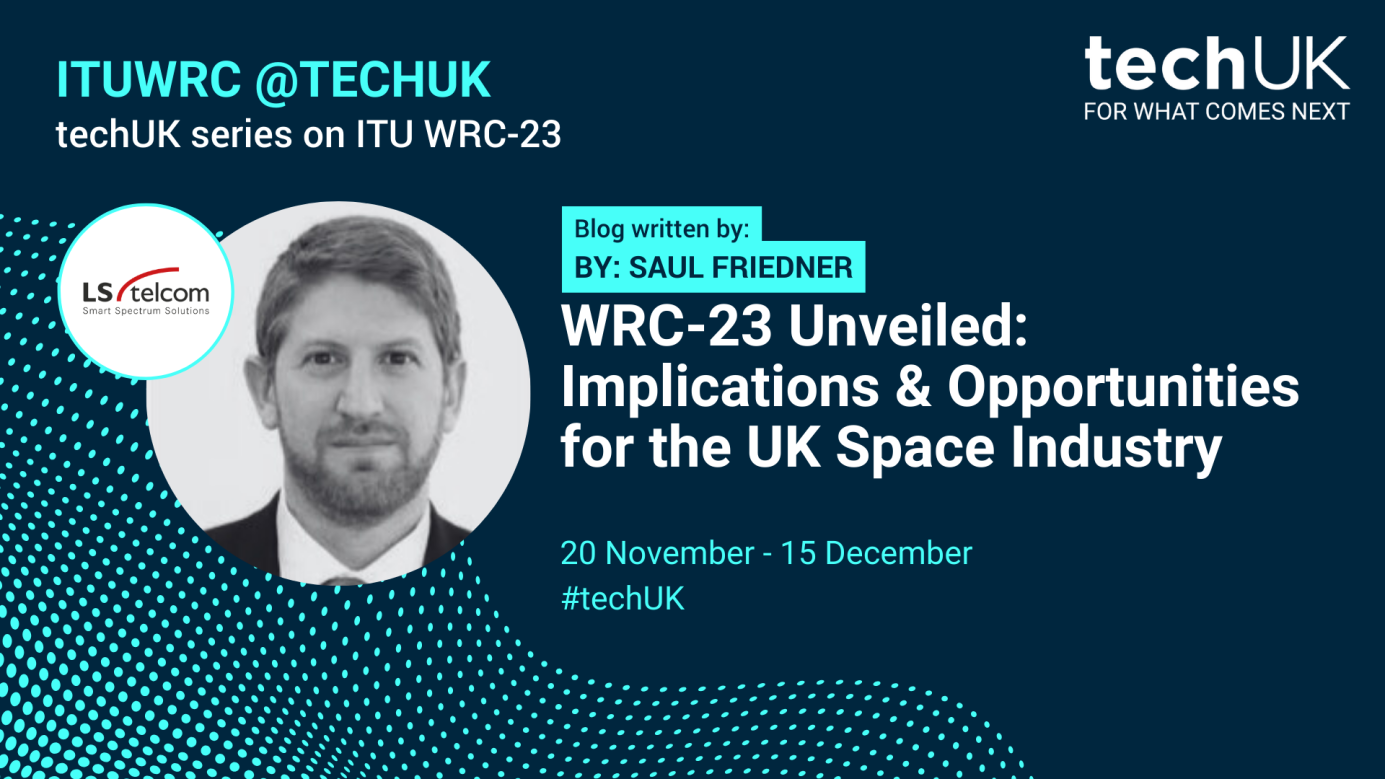WRC Series: WRC-23 Unveiled: Implications and opportunities for the UK space industry

In a time where the spotlight on the space industry has never been brighter, the World Radio Conference 2023, held in Dubai, takes centre stage. From the evolution of direct-to-handset communication to the pressing issue of space sustainability, decisions made at this international summit are poised to shape the future of the UK’s dynamic space sector.
Regulating a fast-moving satellite sector
As the UK space industry continues its remarkable growth, boasting a workforce of 48,800 people and generating an impressive income of £17.5 billion annually, the sector is anticipated to achieve even greater success. Projections indicate that by 2030, the UK space industry could be valued at over £40 billion.
The surge in growth has been propelled by increased public and private interest and investment, advancements in affordability (such as launching of satellites), and the escalating exploitation of satellite data – which has created an urgency for industry players to reshape traditional approaches to the market.
Another crucial factor is the rapid technological advancements, such as the significant deployment of non-geostationary satellite orbit (NGSO) systems. However, with some projections indicating as many as 100,000 satellites orbiting Earth by 2030, a substantial increase from the current 9,000 satellites (approximately), the critical need for coordination and management of these systems becomes evident.
LS telcom UK has been involved in a number of projects recently relating to the use of satellites and in particular the challenges faced by new Non- Geostationary Orbit satellite operators seeking to deploy their services in the UK.
Changes to the regulations within WRC may help unlock some of the barriers to deployment from a spectrum perspective. Ofcom published its space spectrum strategy in November 2022, that indicates Ofcom will have a strong focus on the opportunities and challenges raised by NSGSO satellite systems. In particular, around the NGSO licensing framework in the UK, but it also points to improvement to international NGSO rules with a focus on rules for NGSO satellite filings.
We would expect, pending a positive outcome from WRC-23, that Ofcom could adopt the agreed regulations and rules to help increase access to spectrum for NGSO operators.
Enabling Suitability through Space
Another consideration is the UK Government’s Space Strategy, which is a lot broader than Ofcom’s space spectrum strategy and covers many more diverse areas in comparison, but it does point to priorities for use of Earth Observation and also civil-defence Space domain Awareness. Earth observations, geospatial data, and derived information play insightful roles in monitoring targets, planning, tracking progress, and helping nations and stakeholders make informed decisions, plans, and on-going adjustments that will contribute toward achieving the UN’s seventeen Sustainable Development Goals (SDGs).
Earth Observation in particular can be linked to WRC agenda item 1.14 which seeks to review and consider possible adjustments of the existing frequency allocations or possible new primary frequency allocations to the Earth exploration-satellite service (passive) in the frequency range 231.5-252 GHz, to ensure alignment with more up-to-date remote-sensing observation requirements. Unlocking access to new spectrum bands for Earth Observation could lead to developments in innovation and addressing some of the UK’s national priorities in this area.
Although not directly linked to WRC, the Government plans to lead the global effort to make space more sustainable. This is high up on the agenda for many global nations as the amount of space debris and junk left orbiting the planet is causing major concern. In the UK, there are plans to develop a new Space Sustainability Standard to help manage and measure space debris but also improve the UK’s capability to repair satellites and approaches to de-orbit satellites. There will be a need for resilient and robust communications infrastructure to manage and support space sustainability from a UK perspective and the work of Government (through funding and its Action Plan) and industry development and innovation will ensure the UK makes a positive contribution to Space Sustainability.
Looking ahead
As the conference unfolds, a wide range of satellite-related agenda items will be discussed in Dubai, including intersatellite links, regulatory frameworks for the use of earth stations in motion—particularly aboard aircraft and ships— narrowband satellite services, and more. However, direct-to-handset satellite communication is unequivocally the technology commanding the most attention.
Though not specifically outlined in this year's WRC agenda, the excitement and expectation surrounding this technology are unmistakable. This heightened interest strongly suggests that it will likely become a key agenda item for the next World Radiocommunication Conference (WRC-27) in four years’ time, as it is already being examined by several ITU study groups.
Overall, the final set of regulations that will be agreed at WRC by 15th December will have some impact on the UK’s future communications capabilities and access to spectrum. It may not impact consumers directly for example, but these decisions will have wider economic and societal implications when adopting the new regulations.
Therefore, it is important for the UK that the outcome from WRC meets the requirements set out by Ofcom and UK Government, so that the communications and wider sector strategies can continue to successfully deliver on their roadmaps and milestones to ultimately ensure economic prosperity for the country.
The outcomes from WRC-23 and prospectus for WRC-27 will be a key topic for the flagship UK SPF Future Spectrum Summit. Be part of the conversation and register here.
To find out more about our WRC 2023 Series, click here. If you would like to contribute, please reach out to [email protected].


